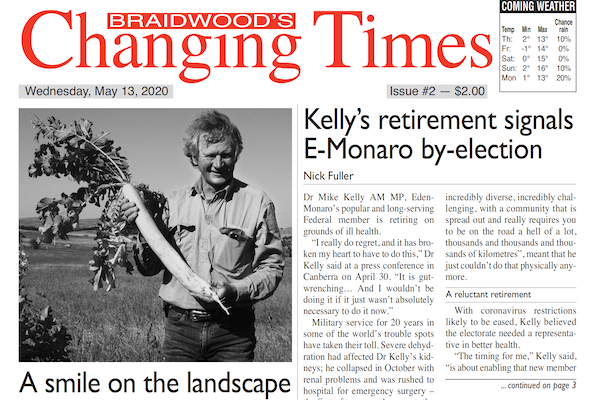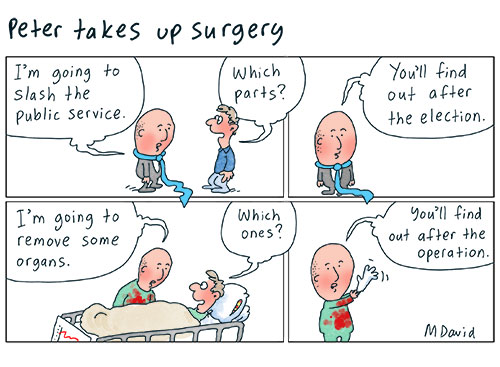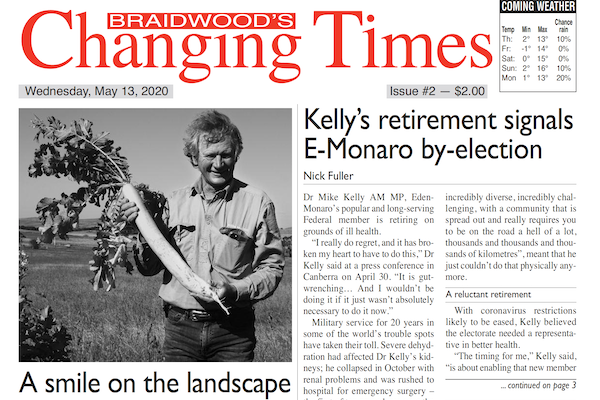It’s simple: local communities want local news regardless of what greedy media oligarchs like Murdoch say, writes Dr Robin Tennant-Wood.
'Do you want to chat about filling the news vacuum ‘til July (and maybe later)? I’m game.'
The message pinged into my inbox the day after our town’s only local paper went into COVID-19 shutdown — its long-term future in the balance.
Local news has a long history in the tiny southern New South Wales town of Braidwood. Dating from the gold rush in the mid-1800s, the Braidwood Dispatch was the original publication from 1858 to 1958.
For a time there was a competitor, the Braidwood Review, and later the Tallaganda Times, which was ultimately bought by Rural Press and became the Braidwood Times. In 2006, Fairfax took over Rural Press, and the paper, a weekly, joined the large stable of Fairfax regional papers.
Fairfax later streamlined its regional operations and the Braidwood Times joined a centralised region with an editor based in Goulburn and printing done at the Canberra Times and a local journalist in Braidwood. In 2018, Nine bought Fairfax and shortly thereafter, the print media side of the company was split, with Nine keeping the large metro daily papers and the regionals sold to Antony Catalano under the Australian Community Media (ACM) banner.
At that point, the Braidwood Times looked to be secure as a local weekly with no changes at grassroots level despite the corporate wranglings at the top.
Then the pandemic started its march across the country. The Canberra Times stood down most of its print staff and in this region, ACM stood down all but the editor in the Goulburn newsroom and suspended production of the entire regional group until late June.
Independent media means independence
It’s relevant that I provide some personal background to this story. In the mid-1800s, my great-great-grandfather founded and edited the Otago Evening Star, a daily newspaper based in Dunedin, New Zealand. In the 1870s, he moved to Australia and founded the Mudgee Daily and then bought the Wagga Wagga Advertiser. Since then, every generation in my family has had at least one person involved in various aspects of media: journalism, photography or, more recently, digital media. I was the journalist on the Braidwood Times in 2018-19, during the various company takeovers and split-ups. I retired in late 2019.
Hence, when ACM announced the shutdown of our local paper, my friend and colleague, Paul Cockram, who publishes a quarterly local magazine, sounded me out about setting up an alternative newspaper to fill the “news vacuum”, as he put it, until the Braidwood Times gets back in production.
Most newspapers in regional towns like Braidwood were originally started by people like my great-great-grandfather. Newspapermen with an entrepreneurial bent who saw a need for local news and had the means to fill that need. These newspapers were all independent insofar as they were privately owned and run with no corporate-political agenda. The Braidwood Dispatch, for example, was founded by James Cosgrove and then bought and run by John Musgrave until his death in 1914. No corporate overlord; no toeing a political line.
Print still rules in regions
When News Corp announced on 28 May that it was closing more than 125 regional papers across Australia, the response was, quite rightly, outrage. While some of these papers will be moving to a digital format, a lot will be gone forever. Setting aside the issue of job losses — and, directly and indirectly, these will number in the thousands – this is a huge blow to regional Australia which relies on its papers for local news.
It’s simple: local communities want local news and, regardless of what greedy media oligarchs like Murdoch say, they want it in print.
Paul Cockram and I looked at the logistics, decided it was possible and published the first issue of Braidwood’s Changing Times on 29 April. The Braidwood branch of the Bendigo Bank bought a full-page ad to assist with production. The branch manager knows his community, understands the value and need for grassroots print media and was quick to get behind the venture.
Community groups and organisations approached us with information and stories and we reported on such local issues as which businesses in town were still trading during the lockdown and what services were available. The local churches, closed since the beginning of the pandemic, were delighted to be able to get news out to parishioners. Braidwood is also a community still very much in recovery from the summer bushfires, and I attend the weekly Zoom meetings with the local council’s bushfire recovery team reporting on such issues as services and assistance available for fire-affected residents.
This is the role of local media — this is why we do what we do.
The response to the Changing Times from locals was immediate and positive. People said they liked the retro 70s-style masthead and the format. The second edition went to print a fortnight later with a flood of local contributions and some letters to the editor. After the first issue, advertising enquiries from local businesses started to arrive in our inboxes.
With three issues now under our belt, Cockram and I believe we have the basis for a permanent local paper in the event that ACM axes the Braidwood Times. And if it doesn’t? We’ve decided to continue anyway and see what happens.
My experience as a country journo tells me that people like to feel ownership of their local media. They like to feel that they have direct access to the person or people who are reporting their news and that they can contribute. In short, a small paper produced in town by people who live here is better than a bigger paper managed from out of town. This, certainly, is the feedback we’re receiving on the main street of Braidwood.
The wheel turns…
With over 125 News Corp regional papers now either axed completely or shifted to online format – and these will likely be subscriber-only – local and regional media is set for a revolution. And by "revolution", I mean that the wheel will revolve back to the start: the independent papers that existed before Big Media stepped in and swallowed them all up.
In towns across Australia where newspapers, some of which have been in print for well over a century, are being shut down by Big Media, there is a gaping hole into which newspapermen and women can, and will, step. Independent media funded by local advertising and sales, and reporting on the issues that are important to small communities is the information lifeblood of regional Australia. Births, deaths, marriages, local sport, school and community group news, council and local politics, stock and station sales, country shows — these are the issues that give form and texture to life in regional towns.
As media people, we have the opportunity and, I would suggest, the responsibility, to ensure our towns are served by independent, locally-run newspapers.
Dr Robin Tennant-Wood is a former lecturer in political science at the University of Canberra and freelance writer and researcher. You can follow Robin on Twitter @rtennantwood.
 This work is licensed under a Creative Commons Attribution-NonCommercial-NoDerivs 3.0 Australia License
This work is licensed under a Creative Commons Attribution-NonCommercial-NoDerivs 3.0 Australia License
Support independent journalism Subscribe to IA.












